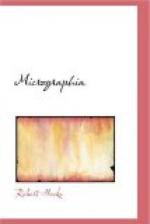And the first is, Whether all those things that we suppose to be bred from corruption and putrifaction, may not be rationally suppos’d to have their origination as natural as these Gnats, who, ’tis very probable, were first dropt into this Water, in the form of Eggs. Those Seeds or Eggs must certainly be very small, which so small a creature as a Gnat yields, and therefore, we need not wonder that we find not the Eggs themselves, some of the younger of them, which I have observ’d, having not exceeded a tenth part of the bulk they have afterwards come to; and next, I have observed some of those little ones which must have been generated after the Water was inclosed in the Bottle, and therefore most probably from Eggs, whereas those creatures have been suppos’d to be bred of the corruption of the Water, there being not formerly known any probable way how they should be generated.
A second is, whether these Eggs are immediately dropt into the Water by the Gnats themselves, or, mediately, are brought down by the falling rain; for it seems not very improbable, but that those small seeds of Gnats may (being, perhaps, of so light a nature, and having so great a proportion of surface to so small a bulk of body) be ejected into the Air, and so, perhaps, carried for a good while too and fro in it, till by the drops of Rain it be wash’d out of it.
A third is, whether multitudes of those other little creatures that are found to inhabit the Water for some time, do not, at certain times, take wing and fly into the Air, others dive and hide themselves in the Earth, and so contribute to the increase both of the one and the other Element.
* * * * *
Postscript.
A good while since the writing of this Description, I was presented by Doctor Peter Ball, an ingenious Member of the Royal Society, with a little Paper of Nuts, which he told me was sent him from a Brother of his out of the Countrey, from Mamhead in Devonshire, some of them were loose, having been, as I suppose, broken off, others were still growing fast on upon the sides of a stick, which seem’d by the bark, pliableness of it, and by certain strings that grew out of it, to be some piece of the root of a Tree; they were all of them dry’d, and a little shrivell’d, others more round, of a brown colour; their shape was much like a Figg, but very much smaller, some being about the bigness of a Bay-berry, others, and the biggest, of a Hazel-Nut. Some of these that had no hole in them, I carefully opened with my Knife, and found in them a good large round white Maggot, almost as bigg as a small Pea, which seem’d shap’d like other Maggots, but shorter. I could not find them to move, though I ghess’d them to be alive, because upon pricking them with a Pinn, there would issue out a great deal of white mucous matter, which seem’d to be from a voluntary contraction of their skin; their husk or matrix consisted of three Coats, like the




